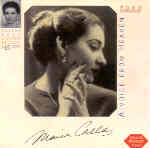Here’s the layout: Callas sings an aria and then another famous soprano in the Public Domain sings it. What we learn is that Galli-Curci is lovely and girlish in Puritani; Tetrazzini, in “Vien diletto”, opts for every staccato high note she can and the result is appalling; Tebaldi in 1950 could sing “O patria mia” meltingly; Gina Cigna’s Norma is a musically approximate event; Rosa Ponselle is unique and fascinating in Leonora’s “Tacea la notte”; Rosa Raisa, when not bulling her way through “D’amor sull’ali rosee”, exhibits a swell trill (and dips into chest voice à la Callas); Claudia Muzio was a terrific Tosca; and Kirsten Flagstad was born to sing Isolde’s Liebestod.
And Callas? Well, all selections are from very early in her career, and the Trovatore, Aida, and Tosca arias are live from Mexico City. In the Trovatore she takes very strange liberties (interpolated high E-flats) and is slightly too intense, and her “Casta diva” is divine, as is Elvira’s scene from Puritani (both, along with her very moving Liebestod in Italian, from studio recordings made in 1949). In brief, if you don’t own Callas in these highlights, you should, and this comparison disc is fun.
































